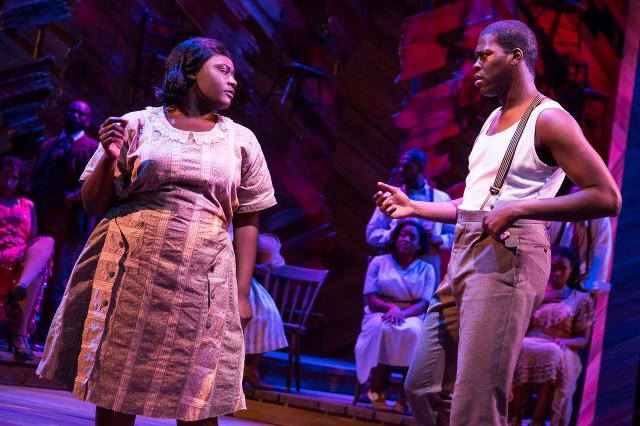
“If God ever listened to a poor colored woman, the world would be a different place,” Celie declares. There’s no doubt that everyone in the audience hears and appreciates the heroine of The Color Purple. Cheers ring through the house, and a standing ovation is given to her final, powerful song “I’m Here,” Cynthia Erivo may have gone on stage as a Broadway unknown, but she’s now a bona fide star.
The setting is rural Georgia, between 1909 and 1949. Celie and her sister Nettie (Joaquina Kalukango) are very close and enjoy nothing more than being together. Celie is 14, Nettie even younger. It comes as a great shock to learn that Celie has had two children by her father (Kevyn Morrow), a fact she acknowledges in a matter-of-fact tone of voice. They have been taken from her, and possibly killed. The whip cracking Mister (Isaiah Johnson) has his eye on Nettie, but settles for taking Celie to be his “wife,” though she actually becomes his slave. He belittles her at every turn and never hesitates to remind her that she’s ugly, black, and a woman. When Mister tries but fails to rape Nettie, who runs away, he takes out his frustration on Celie. She’s forbidden to have anything to do with her beloved sister; this includes Mister withholding Nettie’s letters to her. Celie starts to worry that Nettie has died. Mister’s son Harpo (Kyle Scatliffe) adores his outspoken wife, Sophia, but can’t control her. Mister insists that Harpo beat her into submission. Celie reluctantly agrees. Sophia storms in, and reads Celie the riot act. Danielle Brooks delivers Sophia’s anthem, “Hell No!” with such power and conviction, the action on stage ceases while the audience roars approval. This spirit later gets Sophia in trouble with the white sheriff and his wife; Sophia can be beaten, but not broken. Mister feels his true love is the gorgeous entertainer Shug Avery. Jennifer Hudson is well worth waiting for as the glamorous chanteuse. She enters fall-down drunk, and laughs at Celie. Soon, however, the women form a bond. Hudson is overtly sexy in her chemise, and in her spangled fuchsia dress, red hot when sings “Push da Button” at Harpo’s juke joint. Her voice, of course, is what we expect it to be- splendid. But Hudson’s real gift is in revealing Shug’s softer side. In her own way, she’s as much a victim as Celie is, and their bond evolves into a true love story. Their tender duet “What About Love?” highlights their desires and needs. This love empowers Celie in a way she could never have imagined; she turns her life around and is able to control her destiny. It’s finally her turn to have good fortune, and the second act finds her not only running a successful clothing business but also discovering that Nettie is alive. She’s been working with missionaries in Africa, and with her are Celie’s two children. Celie finds out that the man she called “Pa” wasn’t really her father. Mister has sought to change his evil ways, and it’s come to light that’s he’s helped bring Adam, Olivia, and Nettie back to Celie. Celie’s made-to-order pants business has caught on with both women and men, and the future looks bright at last. To say that this cast is brilliantly talented is a vast understatement. Not only are the principals awe inspiring, but every member of the ensemble brings a divine voice and total conviction to the show. Director John Doyle has stayed faithful to Alice Walker’s 1982 Pulitzer Prize winning novel but has showcased the essential heart of the story with very little embellishment onstage. The backdrop of ascending straight-back chairs emphasizes Doyle’s vision of presenting the work as a folk tale, complete with hero, villains, and the ultimate happy ending. The title song, “The Color Purple,” reminds us of the many things for which we should be grateful. Even in our darkest hour, we’re not alone. There’s much to cherish in the simple gifts of our world, as well as in the life changing moments. Add The Color Purple to the list of wonderful things for which we can give thanks.
